Rachel Mawer
@rmawer.bsky.social
Researcher interested in fish movement + acoustic telemetry
Currently at Swansea Uni
Currently at Swansea Uni
Pinned
Rachel Mawer
@rmawer.bsky.social
· Apr 10
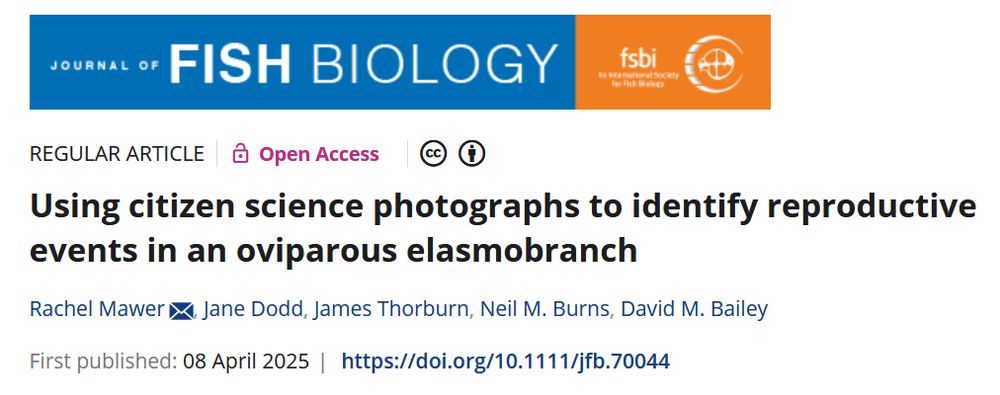
New paper! We estimated the reproductive timing of the critically endangered #flapperskate by making use of a pre-existing #citizenscience photo ID database 📸 with @davemarinebio.glasgow.ac.uk @jathorburn.bsky.social Paper ⏩ doi.org/10.1111/jfb.... & summary below ⏬
Day 3 at #EEA2025 , great to hear from Steven Benjamins about the current status of Skatespotter, a flapper skate photo ID database I was briefly involved with in 2018/19 for my masters! One individual has been recaptured 28 times in 6 years!! 🤯 Very cool

October 31, 2025 at 9:08 AM
Day 3 at #EEA2025 , great to hear from Steven Benjamins about the current status of Skatespotter, a flapper skate photo ID database I was briefly involved with in 2018/19 for my masters! One individual has been recaptured 28 times in 6 years!! 🤯 Very cool
Great start to #EEA2025 today! Lots of interesting talks on elasmos & the chance to present some of our skate tracking work in the Bristol Channel 😁
🦈 Telemetry research in the Bristol Channel (UK) is providing data on the movement and seasonal spatial patterns of thornback, blonde, spotted and small-eyed rays, including a glimpse of potentially important areas #EEA2025 @rmawer.bsky.social

October 29, 2025 at 9:14 PM
Great start to #EEA2025 today! Lots of interesting talks on elasmos & the chance to present some of our skate tracking work in the Bristol Channel 😁
Reposted by Rachel Mawer
The next International Statistical Ecology Conference (ISEC) will take place in Mérida, México, on January 8-15, 2027. Very exciting!
The organisers are inviting submissions for workshops and round table discussions: statisticalecology.org (Deadline: November 15th)
The organisers are inviting submissions for workshops and round table discussions: statisticalecology.org (Deadline: November 15th)
Home - ISEC 2027
Call for Workshop Submissions, Deadline Nov 15th -- Submit Workshop Proposal Call for Roundtable Submissions, Deadline Nov 15th -- Submit Roundtable Proposal The International Statistical Ecology Conf...
statisticalecology.org
October 15, 2025 at 11:38 AM
The next International Statistical Ecology Conference (ISEC) will take place in Mérida, México, on January 8-15, 2027. Very exciting!
The organisers are inviting submissions for workshops and round table discussions: statisticalecology.org (Deadline: November 15th)
The organisers are inviting submissions for workshops and round table discussions: statisticalecology.org (Deadline: November 15th)
Two great days this week tagging skate in the Bristol Channel - we managed to catch + tag individuals across four species of skate 🥳 These skate will be tracked for the next few years across our channel-wide array so we can learn about their movement patterns and spatial usage #trackingnotslacking


October 8, 2025 at 1:50 PM
Two great days this week tagging skate in the Bristol Channel - we managed to catch + tag individuals across four species of skate 🥳 These skate will be tracked for the next few years across our channel-wide array so we can learn about their movement patterns and spatial usage #trackingnotslacking
This week we've deployed another line of acoustic receivers across the Bristol Channel 🥳 hopefully, these receivers will give us a better idea of when our tagged fish, sharks + skate migrate out from the channel, and maybe detect some animals from further afield 👀

September 25, 2025 at 11:11 AM
This week we've deployed another line of acoustic receivers across the Bristol Channel 🥳 hopefully, these receivers will give us a better idea of when our tagged fish, sharks + skate migrate out from the channel, and maybe detect some animals from further afield 👀
Really nice to see this article on the sustainable lobster fishery and marine conservation at Tristan da Cunha - a great example of a community closely entwined with conservation and the challenges with enforcing a huge no-take zone (687000 km^2!) in such a remote area www.bbc.co.uk/future/artic...

Tristan da Cunha: The lobsters keeping Earth's remotest town afloat
The most remote inhabited island is racing to protect its seas – and only source of income.
www.bbc.co.uk
September 18, 2025 at 11:45 AM
Really nice to see this article on the sustainable lobster fishery and marine conservation at Tristan da Cunha - a great example of a community closely entwined with conservation and the challenges with enforcing a huge no-take zone (687000 km^2!) in such a remote area www.bbc.co.uk/future/artic...
Reposted by Rachel Mawer
Victoria Paterson and I are abseiling off a building here at the University of Glasgow to raise money for student expeds. This is to help disadvanaged students take up these amazing, life changing opportunities @uofglasgow.bsky.social
www.justgiving.com/page/paterso...
We'd appreciate you support
www.justgiving.com/page/paterso...
We'd appreciate you support

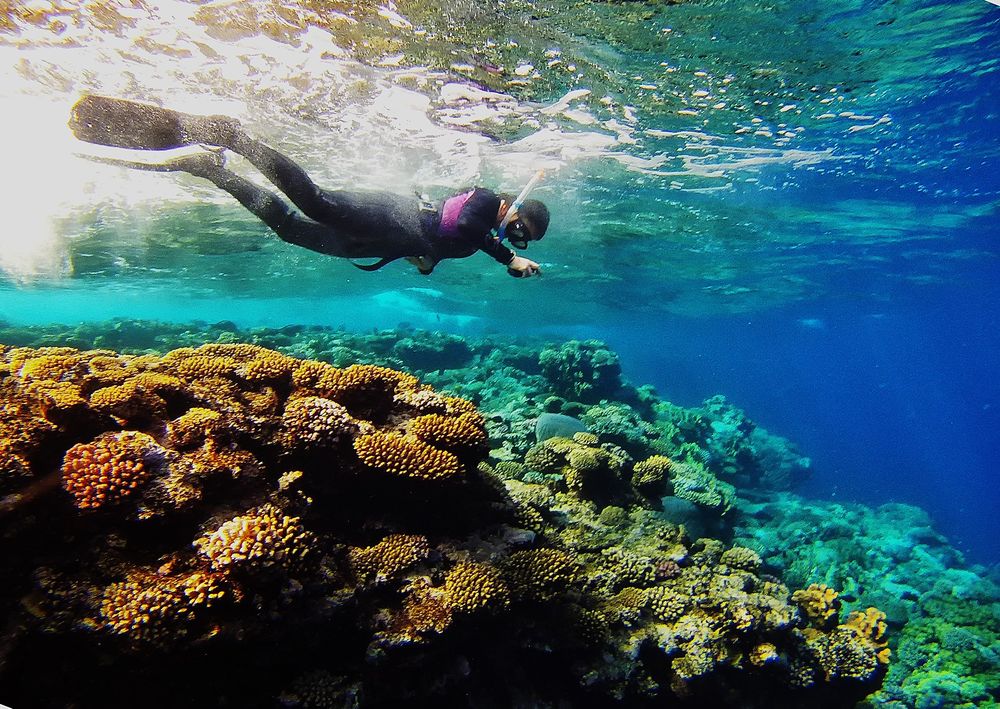
September 17, 2025 at 9:33 AM
Victoria Paterson and I are abseiling off a building here at the University of Glasgow to raise money for student expeds. This is to help disadvanaged students take up these amazing, life changing opportunities @uofglasgow.bsky.social
www.justgiving.com/page/paterso...
We'd appreciate you support
www.justgiving.com/page/paterso...
We'd appreciate you support
Reposted by Rachel Mawer
Fishermen & divers of the UK we need YOU! Our #octopus bloom surveys have been extended to Sept 21st. If you haven't already done so, please fill out the fishermen's survey survey.alchemer.eu/s3/90884550/... or divers survey survey.alchemer.eu/s3/90886025/... Thank you! Please share widely! 🐙


September 14, 2025 at 2:08 AM
Fishermen & divers of the UK we need YOU! Our #octopus bloom surveys have been extended to Sept 21st. If you haven't already done so, please fill out the fishermen's survey survey.alchemer.eu/s3/90884550/... or divers survey survey.alchemer.eu/s3/90886025/... Thank you! Please share widely! 🐙
Reposted by Rachel Mawer
The hmmTMB paper is finally out in the Journal of Statistical Software!
An R package for hidden Markov models with random effects, flexible spline-based covariate effects, and fast inference using TMB or Stan.
Check out the GIthub repository for more examples.
doi.org/10.18637/jss...
An R package for hidden Markov models with random effects, flexible spline-based covariate effects, and fast inference using TMB or Stan.
Check out the GIthub repository for more examples.
doi.org/10.18637/jss...

hmmTMB: Hidden Markov Models with Flexible Covariate Effects in R by Théo Michelot
<p>Hidden Markov models (HMMs) are widely applied in studies where a discrete-valued process of interest is observed indirectly. They have for example been used to model behavior from human and animal...
doi.org
September 12, 2025 at 11:37 AM
The hmmTMB paper is finally out in the Journal of Statistical Software!
An R package for hidden Markov models with random effects, flexible spline-based covariate effects, and fast inference using TMB or Stan.
Check out the GIthub repository for more examples.
doi.org/10.18637/jss...
An R package for hidden Markov models with random effects, flexible spline-based covariate effects, and fast inference using TMB or Stan.
Check out the GIthub repository for more examples.
doi.org/10.18637/jss...
Reposted by Rachel Mawer
Using a pre-existing photo-ID database, Mawer et al. identified potential signs of reproductive behaviours in flapper skate, which suggest a winter-spring mating period doi.org/10.1111/jfb.70044 #FishSci #JFB
doi.org
July 22, 2025 at 3:29 PM
Using a pre-existing photo-ID database, Mawer et al. identified potential signs of reproductive behaviours in flapper skate, which suggest a winter-spring mating period doi.org/10.1111/jfb.70044 #FishSci #JFB
Yesterday out downloading receivers along the Gower, perfect day for it and a highlight being the sunfish we saw on the way out 🤩


July 10, 2025 at 9:51 AM
Yesterday out downloading receivers along the Gower, perfect day for it and a highlight being the sunfish we saw on the way out 🤩
Reposted by Rachel Mawer
#JFB: Using citizen science photographs to identify reproductive events in an oviparous elasmobranch doi.org/10.1111/jfb.70044 #FishSci
doi.org
June 30, 2025 at 7:29 AM
#JFB: Using citizen science photographs to identify reproductive events in an oviparous elasmobranch doi.org/10.1111/jfb.70044 #FishSci
Reposted by Rachel Mawer
New paper out today! 🦈
We tested whether blacktip reef shark dorsal fins are reliable for photo ID – they are!
✅ Stable over time
✅ Unique among individuals
📍Long-term dataset from French Polynesia
Led by Physioshark
🔗 doi.org/10.1111/jfb....
#SharkScience #MarineBiology
@jcuofficial.bsky.social
We tested whether blacktip reef shark dorsal fins are reliable for photo ID – they are!
✅ Stable over time
✅ Unique among individuals
📍Long-term dataset from French Polynesia
Led by Physioshark
🔗 doi.org/10.1111/jfb....
#SharkScience #MarineBiology
@jcuofficial.bsky.social
June 19, 2025 at 6:24 AM
New paper out today! 🦈
We tested whether blacktip reef shark dorsal fins are reliable for photo ID – they are!
✅ Stable over time
✅ Unique among individuals
📍Long-term dataset from French Polynesia
Led by Physioshark
🔗 doi.org/10.1111/jfb....
#SharkScience #MarineBiology
@jcuofficial.bsky.social
We tested whether blacktip reef shark dorsal fins are reliable for photo ID – they are!
✅ Stable over time
✅ Unique among individuals
📍Long-term dataset from French Polynesia
Led by Physioshark
🔗 doi.org/10.1111/jfb....
#SharkScience #MarineBiology
@jcuofficial.bsky.social
It's #worldalbatrossday ! I was lucky enough to see lots of adult Atlantic yellow-nose albatrosses nesting back in September, such gorgeous birds 😍

June 19, 2025 at 9:53 AM
It's #worldalbatrossday ! I was lucky enough to see lots of adult Atlantic yellow-nose albatrosses nesting back in September, such gorgeous birds 😍
Reposted by Rachel Mawer
Oh wow- my article about what's happened to sharks since Jaws came out 50 years ago is featured in today's JSTOR Daily newsletter!
daily.jstor.org/jaws-feather...
daily.jstor.org/jaws-feather...

Jaws, Feathers, and Family Abolition - JSTOR Daily
Well-researched stories from The Revelator, Smithsonian Magazine, and other great publications that bridge the gap between news and scholarship.
daily.jstor.org
June 18, 2025 at 4:19 PM
Oh wow- my article about what's happened to sharks since Jaws came out 50 years ago is featured in today's JSTOR Daily newsletter!
daily.jstor.org/jaws-feather...
daily.jstor.org/jaws-feather...
Reposted by Rachel Mawer
@fao.org released their 2025 report on the status of marine fisheries resources (openknowledge.fao.org/items/ac6d51...).
In talking to the media about the report at #UNOC FAO stated that ~57% of sharks stocks are sustainably fished (t.co/fVFnZkY4vQ).
This fact is WRONG
1/
In talking to the media about the report at #UNOC FAO stated that ~57% of sharks stocks are sustainably fished (t.co/fVFnZkY4vQ).
This fact is WRONG
1/
Review of the state of world marine fishery resources – 2025
Marine fisheries are crucial to the food security and nutrition, economy and overall well-being of coastal communities. Maintaining the long-term prosperity and sustainability of marine fisheries is t...
openknowledge.fao.org
June 11, 2025 at 8:47 PM
@fao.org released their 2025 report on the status of marine fisheries resources (openknowledge.fao.org/items/ac6d51...).
In talking to the media about the report at #UNOC FAO stated that ~57% of sharks stocks are sustainably fished (t.co/fVFnZkY4vQ).
This fact is WRONG
1/
In talking to the media about the report at #UNOC FAO stated that ~57% of sharks stocks are sustainably fished (t.co/fVFnZkY4vQ).
This fact is WRONG
1/
Reposted by Rachel Mawer
Put this on your reading list: Continuous-time HMMs for animal movement data.
I saw Dom present a great intro to this work at ISEC 2024. The gist is it's a very fast model for fitting HMMs to temporally irregular data (based on maximum likelihood).
I saw Dom present a great intro to this work at ISEC 2024. The gist is it's a very fast model for fitting HMMs to temporally irregular data (based on maximum likelihood).
📖Published📖
FInCH: Fast statistical inference for continuous-time animal movement 🐾
FInCH: Fast statistical inference for continuous-time animal movement 🐾
buff.ly
June 16, 2025 at 1:06 PM
Put this on your reading list: Continuous-time HMMs for animal movement data.
I saw Dom present a great intro to this work at ISEC 2024. The gist is it's a very fast model for fitting HMMs to temporally irregular data (based on maximum likelihood).
I saw Dom present a great intro to this work at ISEC 2024. The gist is it's a very fast model for fitting HMMs to temporally irregular data (based on maximum likelihood).
Reposted by Rachel Mawer
NEW in @science.org Global tracking #MarineMegafauna shows <8% of areas used overlap w/ existing MPAs, while >75% of important areas overlapped by threats like #fishing #shipping & ocean warming - 30x30 goal will be insufficient for their conservation www.megamove.org @thembauk.bsky.social
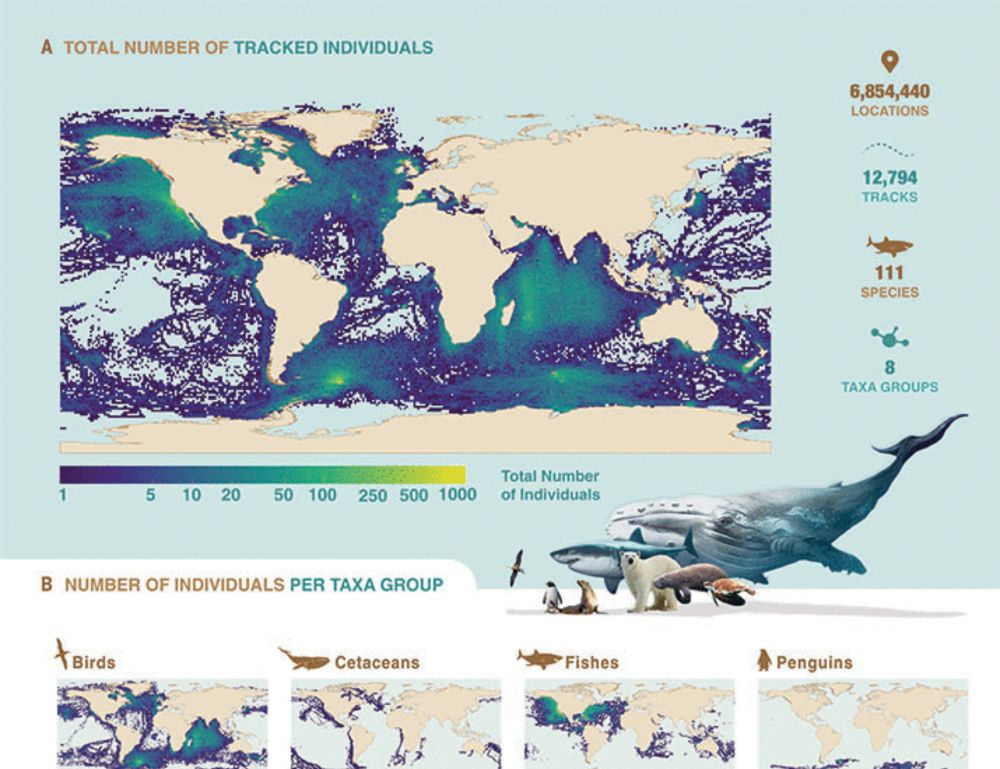
Global tracking of marine megafauna space use reveals how to achieve conservation targets
The recent Kunming-Montreal Global Biodiversity Framework (GBF) sets ambitious goals but no clear pathway for how zero loss of important biodiversity areas and halting human-induced extinction of thre...
science.org
June 5, 2025 at 6:41 PM
NEW in @science.org Global tracking #MarineMegafauna shows <8% of areas used overlap w/ existing MPAs, while >75% of important areas overlapped by threats like #fishing #shipping & ocean warming - 30x30 goal will be insufficient for their conservation www.megamove.org @thembauk.bsky.social
Reposted by Rachel Mawer
Delighted to see the first chapter of my PhD published in the @icesmarine.bsky.social journal of marine science!
This paper discusses developing a holistic understanding of the sensitivity of fish species in our seas and offers practical recommendations for enchanced species mgmt & protection. 🦈🐟
This paper discusses developing a holistic understanding of the sensitivity of fish species in our seas and offers practical recommendations for enchanced species mgmt & protection. 🦈🐟
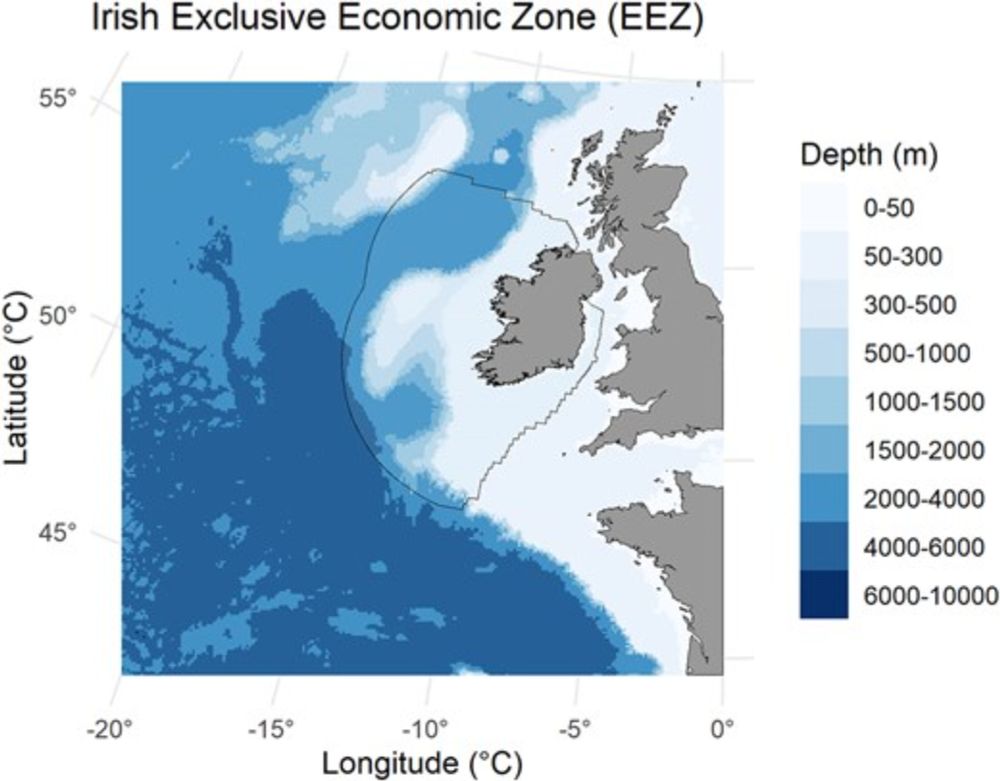
Multiple sensitivity metrics are needed to adequately assess a species’ sensitivity for conservation and management
Abstract. Fish populations are declining globally due to increasing anthropogenic pressures. While research has been carried out to understand the impacts
academic.oup.com
June 3, 2025 at 1:03 PM
Delighted to see the first chapter of my PhD published in the @icesmarine.bsky.social journal of marine science!
This paper discusses developing a holistic understanding of the sensitivity of fish species in our seas and offers practical recommendations for enchanced species mgmt & protection. 🦈🐟
This paper discusses developing a holistic understanding of the sensitivity of fish species in our seas and offers practical recommendations for enchanced species mgmt & protection. 🦈🐟
Reposted by Rachel Mawer
If you would like to know more about our Pollack Fisheries Industry Science Partnership project then click here: www.plymouth.ac.uk/research/mar... @plymbiomarsci.bsky.social @plymuni.bsky.social @anglingtrust.bsky.social 🐟
May 21, 2025 at 3:16 PM
If you would like to know more about our Pollack Fisheries Industry Science Partnership project then click here: www.plymouth.ac.uk/research/mar... @plymbiomarsci.bsky.social @plymuni.bsky.social @anglingtrust.bsky.social 🐟
New paper! We estimated the reproductive timing of the critically endangered #flapperskate by making use of a pre-existing #citizenscience photo ID database 📸 with @davemarinebio.glasgow.ac.uk @jathorburn.bsky.social Paper ⏩ doi.org/10.1111/jfb.... & summary below ⏬

April 10, 2025 at 9:04 AM
New paper! We estimated the reproductive timing of the critically endangered #flapperskate by making use of a pre-existing #citizenscience photo ID database 📸 with @davemarinebio.glasgow.ac.uk @jathorburn.bsky.social Paper ⏩ doi.org/10.1111/jfb.... & summary below ⏬
Reposted by Rachel Mawer
🌐 "We propose a paradigm shift in ecological science, moving from simplifying frameworks that use species, population or community averages to an integrative approach that recognizes individual organisms as fundamental agents of ecological change."
doi.org/10.3897/ibe....
doi.org/10.3897/ibe....
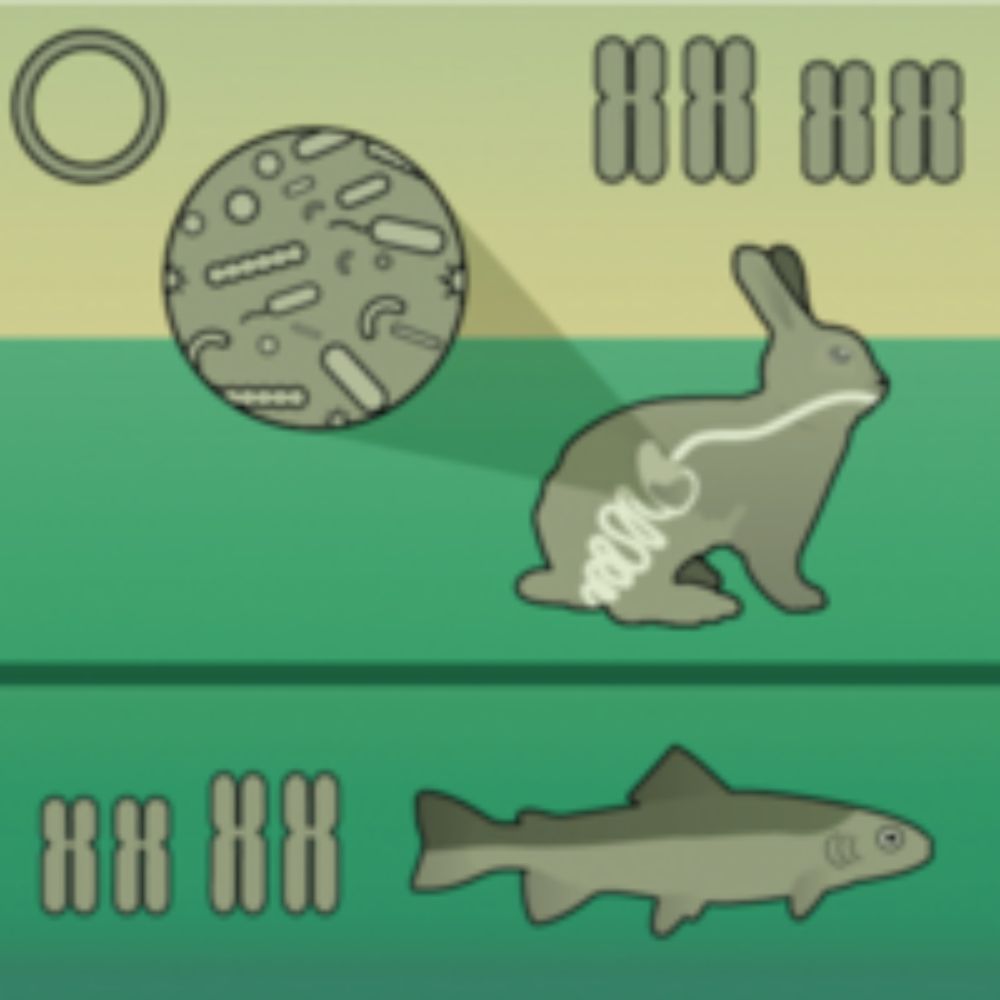
The need for an individual-based global change ecology
Biodiversity loss and widespread ecosystem degradation are among the most pressing challenges of our time, requiring urgent action. Yet our understanding of their causes remains limited because prevai...
doi.org
April 2, 2025 at 2:42 PM
🌐 "We propose a paradigm shift in ecological science, moving from simplifying frameworks that use species, population or community averages to an integrative approach that recognizes individual organisms as fundamental agents of ecological change."
doi.org/10.3897/ibe....
doi.org/10.3897/ibe....
Monday was my last day working at Plymouth uni, as the #PollackFISP project came to an end - been a great few months hopping in and working on some cool research including #acoustictelemetry !! Onto the next job 🤩

April 2, 2025 at 6:07 PM
Monday was my last day working at Plymouth uni, as the #PollackFISP project came to an end - been a great few months hopping in and working on some cool research including #acoustictelemetry !! Onto the next job 🤩
Recommend #acoustictelemetry users check out James's new paper! Getting accurate positions can be a big challenge - and having accurate positions affects later analyses and conclusions. James's work is making a big difference here! #trackingnotslacking
New #FishSci #AcousticTelemetry positioning paper: PMC-TOA positioning.
I used adaptive importance sampling & mixture distributions to position fish in environments prone to tag reflections. Mixed with post-processing, this gives great tracks!
doi.org/10.1111/2041...
I used adaptive importance sampling & mixture distributions to position fish in environments prone to tag reflections. Mixed with post-processing, this gives great tracks!
doi.org/10.1111/2041...



March 18, 2025 at 11:03 AM
Recommend #acoustictelemetry users check out James's new paper! Getting accurate positions can be a big challenge - and having accurate positions affects later analyses and conclusions. James's work is making a big difference here! #trackingnotslacking


